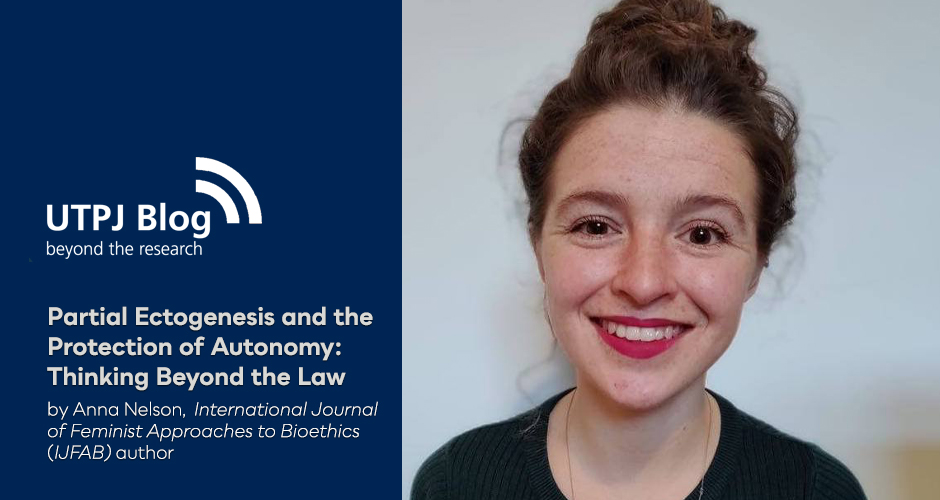
Written by guest blogger Anna Nelson, PhD Candidate, University of Manchester.
My article in the International Journal of Feminist Approaches to Bioethics (IJFAB) comes from my doctoral research about the relationship between partial ectogenesis (PE)—the procedure whereby a fetus is extracted from the human uterus, and transferred to an artificial uterus to complete gestation ex utero—and the autonomy of the pregnant person. In the article, I suggest that by refocusing the discussion about PE through the lens of the choice in childbirth discourse we can more effectively centre the pregnant person in discussions about, and regulation of, this procedure.
However, the article also has a broader significance to me as it represents the way that my thinking and approach to this issue has developed throughout the course of my PhD. The question which sits at the heart of my research is how, or indeed whether, it is possible to introduce PE in a manner which avoids further eroding the autonomy of the birthing person. Armed with a legal education, I envisaged that the answers to this would lie squarely within the legislative and regulatory approaches to this procedure. However, the more I researched, the more apparent it became that a decontextualized and solely legalistic view of PE was not particularly helpful.
In the UK, there is substantial protection for the autonomy of the pregnant and birthing person embedded within the black letter of the law. Despite this, there is a wealth of evidence which demonstrates that birthing people continue to struggle to assert this legal right in reality. If the law is already failing at effectively enacting its clearly stated commitment to the autonomy of the capacitous pregnant individual, why should we expect a different result when it comes to PE – a procedure which would bring the foetus (as a discrete entity) more sharply into focus than ever before?
This realization coincided with some other work I was doing on unconsented vaginal examinations during birth. In the course of this secondary work, I had found myself engaging with questions related to the importance of language and framing in tackling reproductive injustices and harms. Slowly the two streams of research coalesced, and I began to take a step back from technical questions about the regulation of PE and instead to consider the wider question of how this procedure was framed and discussed, and what impact this might have on its autonomy-supporting potential.
This does not mean that the law has no role to play. Rather, in first seeking answers to these broader and more fundamental questions we are able to give ourselves the greatest chance at regulating PE in a manner which may actually ensure that its introduction does not further erode the autonomy of the pregnant individual. This is because we are able to place, at the heart of that regulation, an understanding of partial ectogenesis as a procedure which happens, first and foremost, to the pregnant individual.

Anna Nelson is a final year PhD candidate at the University of Manchester. Her doctoral research explores the intersection between autonomy, partial ectogenesis and the law. She has a wider research interest in choice during childbirth, reproductive justice and medical misogyny.
Social Media:
@Anna_Nelson95 #ChoiceInChildbirth #Ectogenesis #ReproEthics
Her article, “Should Delivery by Partial Ectogenesis Be Available on Request of the Pregnant Person?”, appears in the latest issue of the International Journal of Feminist Approaches to Bioethics.
The UTP Journals blog features guest posts from our authors. The opinions expressed in these posts may not necessarily represent those of UTP Journals and their clients.
Comments on this entry are closed.